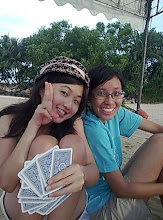My interest in chemistry from a young age finds myself currently pursuing a Bachelor of Science degree in Chemistry at National University of Singapore. In my college days, I was offered to participate in the Chemistry Olympiad programme in recognition of my results in the subject.
Besides striving for excellence in my studies, I cultivate my non-academic skills through various activities. Being a president of the Computer Club in my secondary school and vice-chairperson of the Mathematical Society in my junior college had honed my leadership skills and cultivated my interpersonal skills.
My responsible nature has brought about my school teachers’ trust in me when I was assigned various posts such as class monitor and subject representative during my pre-undergraduate days.
Saturday, October 18, 2008
Saturday, October 11, 2008
Blog Post #5
Everyone has their own way of handling things, thus there will be times when ideas clash. Whether a group makes or breaks depends on how the members handle the differences among themselves. Fortunately for my group, we do not have much problem in this area. The differences serve to enhance the scope of our project instead. Effective communication comes into play during moments of misunderstanding, not only from the speaker, but also from the listeners. Ineffective communication of ideas lead to time wastage from explanation on one’s part and the redoing of a particular portion of the project.
For the whole thing to work, it is more of give-and-take, rather than equal distribution of workload. As a team player, we should understand each member’s difficulty and do our part to relieve the worries of the other members. For example, one can offer to do more of a certain part of the project if the others were busy at that period instead of insisting equal division of the project. This not only improves the relationship among the members, but also ensures that that portion of the project is handled as best it could be.
The primary portion of the research (for our case, it was the surveying of NUS undergraduates) has to be performed with care. My group attempted to obtain our findings through surveying NUS undergraduates. From the feedback from our friends who were not involved in the project, we realised there were ambiguities in the surveys. The ideas we tried to convey were apparently lost through the process of scripting the questionnaire. This caused some uncertainty when we tried to interpret and analyse the results. We were vacillating between the alternatives that arose due to the language issue present in the survey and the original notion we had behind the survey questions.
For the whole thing to work, it is more of give-and-take, rather than equal distribution of workload. As a team player, we should understand each member’s difficulty and do our part to relieve the worries of the other members. For example, one can offer to do more of a certain part of the project if the others were busy at that period instead of insisting equal division of the project. This not only improves the relationship among the members, but also ensures that that portion of the project is handled as best it could be.
The primary portion of the research (for our case, it was the surveying of NUS undergraduates) has to be performed with care. My group attempted to obtain our findings through surveying NUS undergraduates. From the feedback from our friends who were not involved in the project, we realised there were ambiguities in the surveys. The ideas we tried to convey were apparently lost through the process of scripting the questionnaire. This caused some uncertainty when we tried to interpret and analyse the results. We were vacillating between the alternatives that arose due to the language issue present in the survey and the original notion we had behind the survey questions.
Subscribe to:
Posts (Atom)
